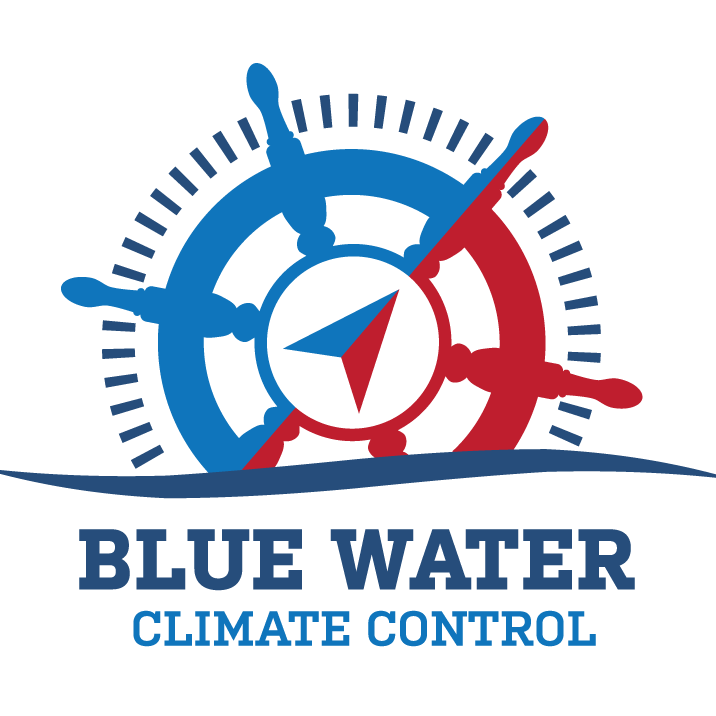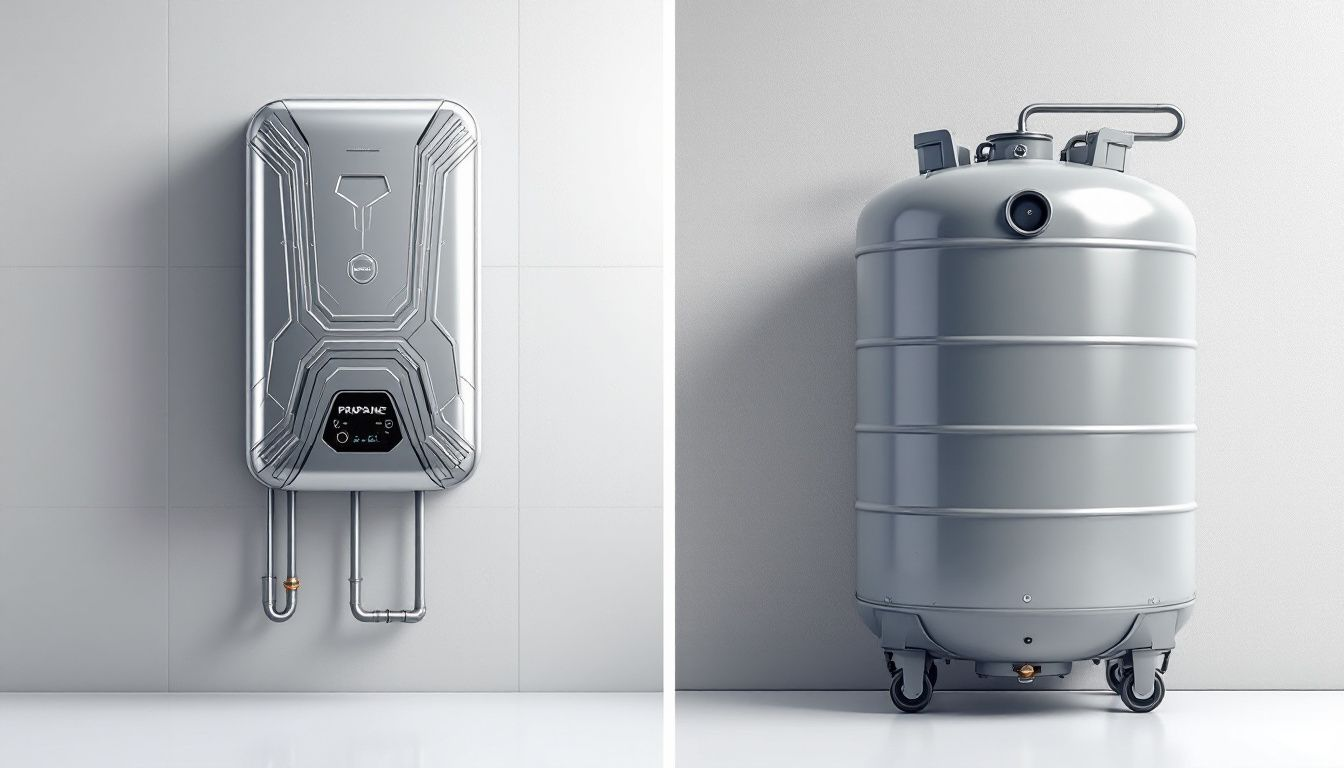Top Propane Tankless Water Heater Options: Efficiency and Convenience
Are you looking for an efficient way to get hot water on demand? A propane tankless water heater could be your answer. In this article, we’ll cover the top models, their benefits, and what to consider when choosing one.
Key Takeaways
Propane tankless water heaters provide on-demand hot water, eliminating energy waste associated with conventional tank models.
Key advantages include energy efficiency, continuous hot water supply, and a compact design, making them ideal for modern and smaller households.
While initial costs may be higher, propane tankless units offer long-term savings on energy bills and have a longer lifespan than traditional water heaters.
Quick Links:
What is a Propane Tankless Water Heater?
Propane tankless water heaters provide hot water on demand. Unlike conventional tank models that continuously heat stored water, these systems heat water as it flows through the unit, eliminating energy waste.
These systems are efficient and capable of providing a continuous hot water supply. Whether for a shower, dishwasher, or washing machine, propane tankless water heaters ensure a steady hot water supply, making them ideal for modern households.
How Propane Tankless Water Heaters Work
Tankless water heaters, or demand-type heaters, heat water as it flows through a heat exchanger. When you turn on a hot water tap, cold water enters the unit and triggers a gas burner or electric heating element, instantly heating the water.
This on-demand heating mechanism ensures a continuous hot water supply while maximizing energy efficiency by eliminating standby heat loss, leading to significant energy savings.
Advantages of Propane Tankless Water Heaters
Propane tankless water heaters have several advantages over traditional tank models, including energy efficiency, a continuous hot water supply, and a compact design.
Let’s delve into each of these benefits in more detail.
Energy Efficiency
A standout feature of propane tankless water heaters is their energy efficiency. By heating water only when needed, they avoid the energy loss of maintaining a hot water tank, reducing energy usage and lowering utility bills.
By minimizing standby heat loss, propane tankless water heaters ensure you only pay for the energy used to heat water when needed. This efficiency translates into substantial energy savings, making them a cost-effective choice for reducing energy costs and environmental impact.
Continuous Hot Water Supply
Another advantage is the ability to provide an endless supply of hot water. Unlike conventional tank models that can run out during peak usage, tankless models heat water on demand.
This continuous supply is beneficial for larger households or homes with high hot water demands. It allows multiple showers and appliances to run simultaneously without depleting the supply, allowing you to enjoy unlimited hot water.
The space-saving design, eliminating the need for a bulky storage tank, makes these units ideal for smaller homes and apartments.
Compact Design
Propane tankless water heaters have a compact footprint and are suitable for various installations. Compared to traditional models, they can save around 12 square feet of space, which is advantageous for homes with limited space.
Their wall-mounting capability enhances versatility by freeing up floor space in cramped areas. Their compact design, reliable performance, and advanced technology make them an excellent choice for tiny homes and modern apartments.
Comparing Propane Tankless Water Heaters to Conventional Tank Models
Several key differences stand out when comparing propane tankless water heaters to conventional tank models. Tankless water heaters provide a continuous hot water supply, eliminating the wait time needed to heat a large volume of water and allowing for unlimited hot water during peak usage.
The compact design of propane tankless models requires less installation space than conventional tanks, making them ideal for homes with limited space. Wall-mounting these units frees up floor space and provides more installation flexibility.
While the initial installation cost for tankless water heaters can be higher due to the complexity of replacing existing systems, the long-term benefits often outweigh these costs. Propane tankless systems generally have a longer lifespan, typically lasting twice as long as conventional tank models, which can reduce replacement costs over time. These heaters deliver hot water almost instantly, providing two to three gallons per minute, unlike storage tanks that may take longer to heat up.
Key Factors to Consider When Choosing a Propane Tankless Water Heater
Choosing the right propane tankless water heater involves considering factors like flow rate, required temperature rise, and the fuel source’s environmental impact. Understanding these aspects helps select a unit that meets your household’s needs and ensures optimal performance.
Flow Rates
The flow rate of a tankless water heater determines the amount of hot water produced per minute. Calculate the gallons per minute (GPM) needed for each fixture that might be used simultaneously by adding up their flow rates to meet your household's peak hot water demand.
Typically, the hot water fl’ hot water flow rate ranges from 2 to 5 gallons per minute, with gas-fired models generally offering higher flow rates.
For larger households, multiple tankless water heaters may be needed to meet simultaneous hot water demands, ensuring consistent availability and efficiency.
Temperature Rise Required
Temperature rise is the difference between the incoming cold water temperature and the desired hot water temperature. To calculate it, subtract the incoming water temperature from the desired delivery temperature. For example, if your cold water is 50°F and you prefer 120°F hot water, the required temperature rise is 70°F.
Understanding the required temperature rise is crucial for selecting a heater to heat water to your desired temperature. Flow rate, time of year, and geographical location can influence this requirement.
Ensuring the correct temperature rise improves efficiency and guarantees a consistent hot water supply, enhancing overall user satisfaction.
Fuel Source and Environmental Impact
Propane tankless water heaters offer significant energy savings by using propane, a clean and efficient fuel source. This leads to substantial reductions in energy costs and utility bills. Additionally, propane helps reduce greenhouse gas emissions, making these heaters environmentally friendly.
The combination of cost savings and a reduced environmental footprint makes propane an excellent choice for minimizing ecological impact. Choosing a propane tankless water heater contributes positively to the environment while enjoying a reliable and efficient system.
Installation and Maintenance of Propane Tankless Water Heaters
Proper installation and regular maintenance are essential for optimal performance and longevity. Hiring a professional ensures the unit is set up correctly and safely, while regular maintenance prevents issues like mineral buildup and maintains efficiency.
Professional Installer vs. DIY
While some homeowners may consider DIY installation, hiring a professional installer is generally advisable. Professionals have the training and experience to ensure proper setup, reduce future maintenance issues, and ensure safe and efficient operation.
Only those with the requisite knowledge and tools should attempt DIY installation. Improper installation can lead to costly repairs and potentially dangerous situations, making professional installation a worthwhile investment.
Regular Maintenance Tips
Regular maintenance is crucial for maintaining efficiency and extending the lifespan of propane tankless water heaters. Flushing the unit annually to remove mineral buildup is essential to prevent performance impairment.
Descaling solutions or vinegar can clean the heat exchanger and prevent clogs from mineral deposits. Performing these maintenance tasks every six months helps ensure efficient operation and consistent hot water delivery.
Cost Considerations and Energy Savings
While propane tankless water heaters may have higher upfront costs than conventional tank models, they offer significant energy savings over time. These units reduce energy waste and lower utility bills by heating water only when needed.
Homes using less than 41 gallons of hot water daily can experience energy savings of 24% to 34% with tankless systems compared to standard heaters. Additionally, the lifespan of a tankless water heater is generally about 20 years, double that of conventional tank models, reducing replacement costs over time.
Maintenance and repair expenses for tankless water heaters are usually lower than those for traditional models, contributing to their long-term cost-effectiveness. Substantial energy savings and reduced operational costs often offset the initial investment in a propane tankless water heater.
Innovative Systems and Advanced Technology
Recent advancements in propane tankless water heaters include intelligent controls and other innovative features that enhance convenience, facilitate management, and improve efficiency.
High-end models now offer features like stage combustion technology, which adapts to varying environmental conditions to maintain optimal performance. Some units have water-controlled automatic ignition, which activates only when water flow is detected, further improving efficiency.
Real-Life Applications and Testimonials
Real-life applications and user testimonials highlight the effectiveness and satisfaction provided by propane tankless water heaters. For instance, one user shared an experience of negotiating a significant discount on a damaged water heater, showcasing the importance of excellent customer service.
Overall, users have reported positive experiences with propane tankless water heaters, emphasizing their reliability, efficiency, and the peace of mind they bring to daily living.
Summary
In summary, propane tankless water heaters offer numerous benefits, including energy efficiency, continuous hot water supply, and a compact design. These advantages make them an excellent choice for modern households looking to upgrade their water heating systems.
By understanding how these heaters work, their advantages, and the key factors to consider when choosing one, you can make an informed decision that best suits your needs. Embrace the convenience and efficiency of propane tankless water heaters and enjoy an endless hot water supply for years to come.
Frequently Asked Questions
How do propane tankless water heaters save energy?
Propane tankless water heaters save energy by heating water only when required, eliminating standby heat loss from traditional storage tanks. This demand-based approach results in substantial energy savings and reduced utility costs.
What is the temperature rise required for a propane tankless water heater?
The temperature rise required for a propane tankless water heater is calculated by subtracting the incoming cold water temperature from the desired hot water temperature. For instance, if the incoming water is at 50°F and the target is 120°F, a temperature rise of 70°F is necessary.
How often should I perform maintenance on my propane tankless water heater?
To ensure efficient operation and longevity, perform maintenance on your propane tankless water heater annually by flushing the unit and cleaning the heat exchanger with descaling solutions every six months. Regular upkeep is essential to prevent mineral buildup.
Are propane tankless water heaters environmentally friendly?
Propane tankless water heaters are indeed environmentally friendly. They use propane, a cleaner fuel that reduces greenhouse gas emissions and energy costs. Consequently, they present a more sustainable option than traditional tank water heaters.
Is hiring a professional installer for a propane tankless water heater necessary?
Hiring a professional installer for a propane tankless water heater is advisable. This ensures proper setup, enhances safety and minimizes future maintenance issues.






